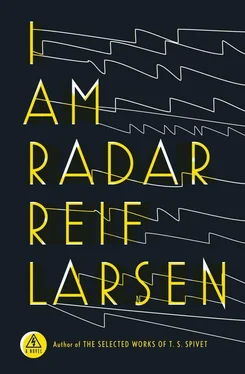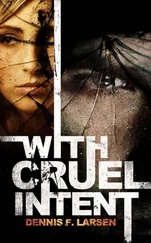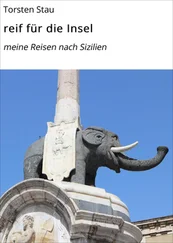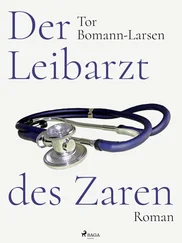“I know how to do this,” he said. “I do not need your book. I know what I want.”
“You do?” she said. Her eyes focusing.
“I always know this,” he said.
“You do?” she said. Lingering, wondering what was happening to the weight of her body.
“What is your name?” Kermin asked. “I want to know this.”
“You do?” she said again, and the thrice-uttered question sealed their fate. It was the kind of collision where there was no time for courtship, where two wounded planets lock into orbit and can never quite free themselves from the insistence of their gravitational pull. Charlene and Kermin. Kermin and Charlene. Each would come to understand, in very different ways, that what had come before was only the tuning of the instruments before the real movement began.
What are you writing?”
Kermin was standing in the doorway of the kitchen. She had risen early and was working away at the typewriter.
“Not really anything,” she said, flushing. She closed the novel and maneuvered the typewriter slightly, so that its page was less visible to the room. “It’s just something for Dr. Fitzgerald.”
Kermin nodded. She watched as he began his morning routine. Since Charlene had known him, his breakfast had never varied: white toast, Marmite, slice of cheese, slice of ham, glass of orange juice. He always ate everything until there was only half a bite left, and then he was finished. His consistency was maddening, but then such consistency had also saved her. After so many years of instability, she had come to depend upon that last half-moon of toast remaining on the plate.
“So this doctor,” Kermin said, uncapping the Marmite jar. “He is good?”
“Yes,” she said. “Of course he’s good.”
Kermin sat down across from her.
“He’s good,” she said again, edging the typewriter away.
He took a loud bite of toast.
“So what did he tell you?” he said. Crumbs.
“About?”
“About Radar.”
“Oh, plenty of things. I mean, they’re still doing tests,” she said. “But we’re very lucky that he agreed to take on Radar in the first place. I mean, he’s the best there is. He’s. .”
She tapped at a key on the typewriter, and a faint F thwacked onto the page. She could feel herself blushing again.
Kermin studied her. After a moment, he let his hand drift over to a shortwave radio sitting on the table. A flick of the wrist and the radio came to life. A loud sea of static enveloped them. He slowly turned the dial, stroking the rib cage of the morning’s frequencies.
“Kermin,” she said. “You’ll wake up Radar. He didn’t sleep last night.”
“This doctor,” he said over the noise. “He is the last.”
“What?”
“After this, no more.”
“Kermin, he’s the best there is,” she said. “We’re so lucky that he even—”
“What did he learn from my blood?” he said without looking up from the radio.
“I don’t know,” she said. “I didn’t ask. They’re looking into various genetical possibilities. Something in our DNA. He said it was very advanced science.”
The radio hung briefly on two stations at once, both voices vying for supremacy through a canopy of static.
“Kerm!” she hissed. “ Please . Turn it off.”
He snapped the dial. A click. A sudden silence.
• • •
IN TRUTH, HER VISITS to Boston were not going as well as she had initially hoped. Although she could not say exactly what it was she was hoping for. The less frequent their appointments, the more fervently she typed. Her Anna Karenina was taking shape, page by page, and at certain moments, when the beat of the typewriter became like a second pulse, she was blessed with the fleeting sensation that she was the writer of this book, that she, Charlene Radmanovic, was conceiving of Vronsky’s torrid pursuit, of Levin’s fervent idealism. Or, more precisely: that the real Anna Karenina had not truly existed until now, until it had flowed through Tolstoy and then through her and come out the other side. But these moments of transcendent begetting were rare. More often than not, she was aware of herself as nothing more than a scribe, a clumsy regurgitator of words. A book was a dead thing; no manner of resuscitation could change that.
When she finally managed to corner him on the phone, Dr. Fitzgerald claimed he had all the data he needed for his article. The news felt like the thinnest of daggers sliding into the soft space between her ribs.
“Can you tell me what’s wrong, then?” she said into the phone.
“Wrong?”
“With him,” she said. “With us .”
“Nothing’s wrong. He’s a beautiful child.”
“You know what I mean.”
There was a pause. “We’re looking into it. I assure you, we’re doing everything we can.”
She breathed. Wanting to say things that could not be said.
“When can we come back?”
“There’s not really a need—”
“But when?”
He agreed to see her the following Monday. In a panic, she stayed up nearly the entire weekend, desperately trying to finish Anna Karenina ’s denouement. Once upon a time, this had been her favorite part of the book, for it was that strangely euphoric space in a novel after the main character is gone, where the author can get away with almost anything. When she had read it all those years ago, she had imagined a world after her own funeral, a world where she existed only in memory. But now, charging through these final pages, Levin’s protracted exchange with the peasant and his resulting epiphany about his own pious fallibility — a realization that had once struck her as desperately profound — came off as dull and belabored. Maybe it was just because she was viewing everything through the lens of transcription, but when, at 3 A.M., she finished typing out Levin’s final declaration to Kitty regarding the power of goodliness, she wanted to shoot the man and Tolstoy for creating such a blatant mouthpiece. And she hated the doctor for goading her into what she now saw as a fruitless endeavor. It was perhaps the loneliest moment of her life.
The next morning, they took the train up to Boston. When they arrived at Dr. Fitzgerald’s office, Radar ran over and punched the doctor in the groin, but playfully, as a kind of familiar salutation.
“Ray Ray!” said Charlene. “Be careful!”
“Doctah Popeye!” said Radar. “Doctah” and “Popeye” were the fourth and ninth words, respectively, in his approximately fifteen-word vocabulary.
“He’s been wanting a Popeye Band-Aid. The one you give him after the blood tests.”
“This can be arranged,” he said. The doctor swung Radar up onto his desk and looked him in the eye. “You’ve done everything we asked and more. You’ve never complained once. I think you’re going to grow up to do something amazing someday. Mark my words.”
Hands fluttering. One became two became one. Radar laughed and did the same back to him, a mirror image: two became one became. . The gesture fell apart.
“You’ll have to practice that one,” said the doctor.
A nurse took Radar from the room for a final physical and the prize of a Band-Aid.
Alone again, they sat in silence.
“Is there anything else?” the doctor said.
Charlene took a breath. From her bag she produced the stack of pages. Her stance toward them had warmed somewhat since her low point. She tidied the pile and then slid them across his desk.
“What’s this?”
“You inspired me,” she said.
He slowly glanced through the pages. Licking his fingers. She tried to read his face.
“I see a mistake,” he noted.
Читать дальше












